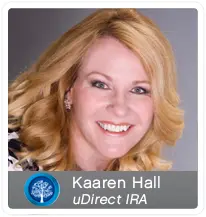From the Desk of Our CEO…
Not a day goes by when there is not some interesting investment idea crosses my desk. Investors are creative people, always thinking up ways to make deals work. Often times these excellent ideas run into a brick wall when it comes to using an IRA. There is usually a way around the wall however and we’ll cover that, too.
For example, recently a gentleman (we’ll call him Bill) called our office and he was making an offer on a property. Bill had not yet opened a self-directed IRA so I let him know that the first step is to have his SDIRA opened and funded so he could proceed without delays.
When someone gives us an application to open an account we get that account opened usually on the same day. Typically it takes about two weeks for another custodian to move funds into the new self-directed IRA whether it’s from another IRA or from a previous employer plan like a 401(k) or a 403(b).
Bill gave me another call a week later and he revealed his full plan. He had found a great deal on a 4-plex and was thinking of buying it with his IRA. First I explained again that the name of the buyer was “Custodian FBO IRA-Owner”. I also explained that Bill did not sign the offer to purchase himself, but rather he was to give that information to us and we would have the contract signed and returned. He wanted to know why he could not sign the offer to purchase himself so I explained the custodian signs purchase documents on behalf of the IRA. The IRA-owner can sign as “read & approved”.
Next came the issue of leverage. Bill wanted to use his IRA as a down-payment on the property. I explained that IRAs are not down-payments (unless the IRA itself is getting a non-recourse loan). Typical lenders do not allow IRAs to be a party to the note because there is no recourse against an IRA. It is possible, however, to have the IRA itself borrow the funds. There are non-recourse lenders out there who make loans to IRAs. The loans are based on location, condition and cash-flow. Sometimes lenders actually want to see a rental agreement signed before they’ll close on a loan like this. These kinds of non-recourse loans are like commercial loans and they have high LTV requirements. The IRA may put 50% into the deal, for example. I provided Bill with a list of non-recourse lenders.
When IRAs do borrow money with non-recourse loans, the IRAs can be taxed. The tax is called UDFI (Unrelated Debt Financed Income Tax). Any property held to produce income is “debt-financed property” if at any time during the tax year there was acquisition indebtedness outstanding for the property. This UDFI tax is at the same rate as the estate tax rate. You can read more about this tax at www.IRS.gov Pub 598. Your CPA reports this on a Form 990t.
So now we had cleared up the issues of “buyer name” and the use of leverage. At this point in the conversation Bill tells me it was his intention to purchase the four-plex and have his son live in the property. This brought up the issue of “prohibited transactions” which usually involve “disqualified people”. Disqualified persons include your fiduciary and members of your family (spouse, ancestor, lineal descendant, and any spouse of a lineal descendant). So, it would be a prohibited transaction for his son to have use of the property owned by his IRA.
If you put yourself in Bill’s shoes, you can see it was an excellent idea to use IRA funds to buy a 4-plex and have his son live there. The IRS would disagree so he had to find some work-arounds.
Bill opened his self-directed IRA and had the funds transferred into it. Then he made an offer on the 4-plex in the name of the IRA. The custodian signed the offer, sent it off to escrow. The earnest money deposit was disbursed from Bill’s IRA. Rather than use borrowed funds, Bill partnered with another real estate investor (thereby avoiding the UDFI tax). His IRA closed on the property and tenants moved in. His son still could not be a tenant but the investment was made and began to cash-flow right away.
I do a lot of public speaking to explain how self-directed IRAs work. So many people feel their retirement funds could be invested somewhere besides the stock market and for over 40 years you’ve been able to invest your IRA into anything except life insurance contracts and collectibles.
If you have a question about how to use your IRA to self-directed you can contact us here at info@uDirectIRA.com or at 714.831.1866. Our website address is www.uDirectIRA.com .
~Kaaren Hall

